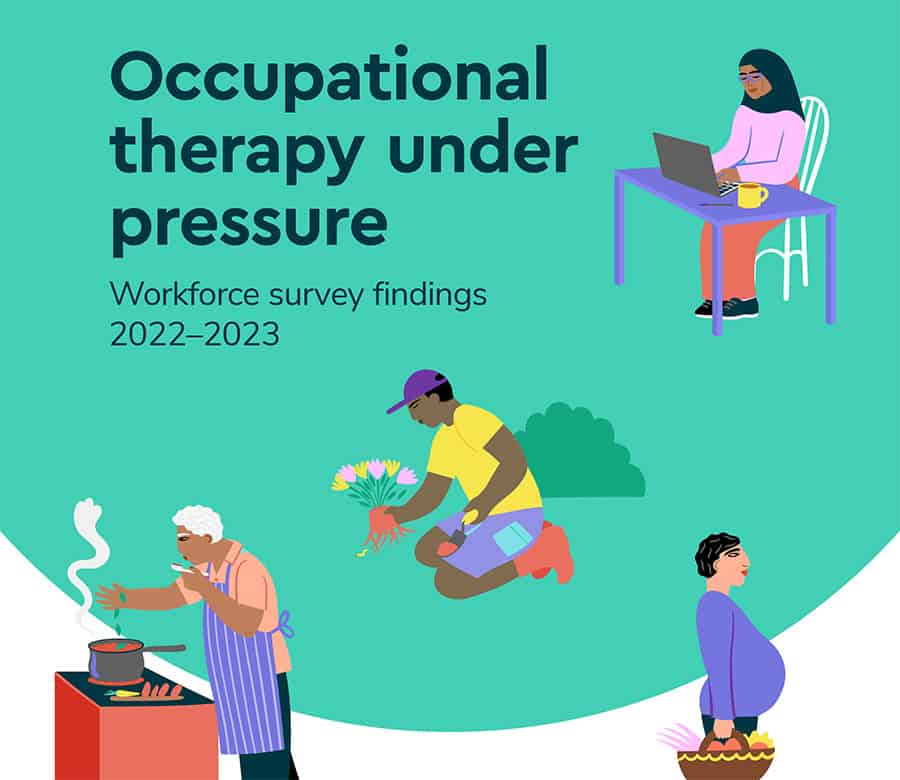Four-fifths of OTs believe surge in demand is due to lack of capacity in health and care system

With 86 percent of occupational therapists (OTs) reporting an increase in demand for their services between November 2021 and November 2022, four in five OTs believe this surge in demand is due to a lack of capacity elsewhere in the health and care system.
The same proportion attribute it to people’s needs becoming more complex because of delays to care and treatment.
This is according to a new report from the Royal College of Occupational Therapists (RCOT) called ‘Occupational therapy under pressure: Workforce survey findings 2022–2023’. The report looked at responses from over 2,600 OTs in the UK about the state of the workforce.
Beyond a lack of capacity in the health and care system, OTs gave other reasons for an increase in demand for occupational therapy services.
Two-thirds of respondents noted that people accessing services are struggling more with activities because of delayed intervention; just over half said people accessing services have increased mental health needs; 52 percent highlighted a lack of available carers; and two-fifths underlined a broader range of referrals being received.
RCOT’s report also revealed that 78 percent said their team was not big enough to meet demand and 55 percent explained that long-standing recruitment issues meant the services they were providing were not meeting people’s needs.
These factors combined are putting a “huge amount” of strain on OTs. Many of the respondents noted that they feel under too much pressure at work or that they are too busy to provide the level of care they would like to.
Worryingly, 48 percent of OTs intend to leave their current role in the next two years because of work-related stress.
Despite the challenges and frustrations, the vast majority of respondents felt positive about their experiences of the profession, with 93 percent describing occupational therapy as a rewarding career and almost nine in 10 saying they would recommend it as a career to others.
RCOT Director of Practice and Innovation, Karin Orman, commented: “Our report shows how closely the different parts of the health and care system need to work together, and how dependent they are on each other. It’s positive to see the value of occupational therapy is being recognised, but it’s deeply shocking to hear occupational therapists say they fear the services they’re providing are unsafe.
“We need to ensure occupational therapists are able to deliver their services safely and efficiently to those who need them. This means filling all vacancies and having enough staff available to meet demand.
“Recruitment and retention of occupational therapists is already a huge issue, and with an increase in demand driving more pressure at work, often with little to no support from managers, this will continue to be an ever-growing problem.
“We want to see more investment in the workforce, including more occupational therapists in leadership roles, and we want leaders in the government and NHS to recognise that investment in health and social care will not only benefit everyone’s health, but could ultimately help boost the economy. We hope that this will be reflected in the forthcoming NHS workforce plan for England.”
Based on the survey responses, RCOT makes a series of key recommendations for political and health and care leaders.
These include expanding the occupational therapy workforce to ensure staff are available to fill current and future vacancies; investing in the occupational therapy workforce and multi-disciplinary teams to ensure workers are properly supported in their roles; and recognising that investment in the NHS and social care is critical to a healthy population and therefore economic growth.
Read the full report here.
Earlier this year, RCOT teamed up with Toyota to put together some tips on helping someone with mobility issues get into and out of a car.

